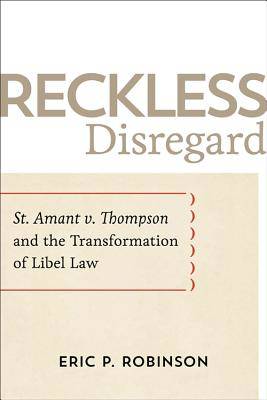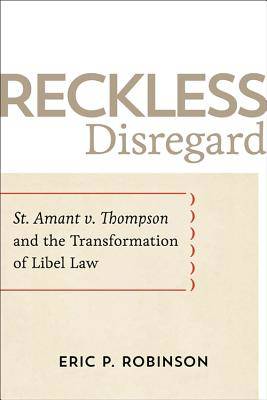
- Afhalen na 1 uur in een winkel met voorraad
- Gratis thuislevering in België vanaf € 30
- Ruim aanbod met 7 miljoen producten
- Afhalen na 1 uur in een winkel met voorraad
- Gratis thuislevering in België vanaf € 30
- Ruim aanbod met 7 miljoen producten
Reckless Disregard
St. Amant V. Thompson and the Transformation of Libel Law
Eric P RobinsonOmschrijving
In the years following the landmark United States Supreme Court decision on libel law in New York Times v. Sullivan, the court ruled on a number of additional cases that continued to shape the standards of protected speech. As part of this key series of judgments, the justices explored the contours of the Sullivan ruling and established the definition of "reckless disregard" as it pertains to "actual malice" in the case of St. Amant v. Thompson. While an array of scholarly and legal literature examines Sullivan and some subsequent cases, the St. Amant case--once called "the most important of the recent Supreme Court libel decisions"--has not received the attention it warrants. Eric P. Robinson's Reckless Disregard corrects this omission with a thorough analysis of the case and its ramifications.
The history of St. Amant v. Thompson begins with the contentious 1962 U.S. Senate primary election in Louisiana, between incumbent Russell Long and businessman Philemon "Phil" A. St. Amant. The initial lawsuit stemmed from a televised campaign address in which St. Amant attempted to demonstrate Long's alleged connections with organized crime and corrupt union officials. Although St. Amant's claims had no effect on the outcome of the election, a little-noticed statement he made during the address--that money had "passed hands" between Baton Rouge Teamsters leader Ed Partin and East Baton Rouge Parish deputy sheriff Herman A. Thompson--led to a defamation lawsuit that ultimately passed through the legal system to the Supreme Court. A decisive step in the journey toward the robust protections that American courts provide to comments about public officials, public figures, and matters of public interest, St. Amant v. Thompson serves as a significant development in modern American defamation law. Robinson's study deftly examines the background of the legal proceedings as well as their social and political context. His analysis of how the Supreme Court ruled in this case reveals the justices' internal deliberations, shedding new light on a judgment that forever changed American libel law.Specificaties
Betrokkenen
- Auteur(s):
- Uitgeverij:
Inhoud
- Aantal bladzijden:
- 288
- Taal:
- Engels
Eigenschappen
- Productcode (EAN):
- 9780807169407
- Verschijningsdatum:
- 12/12/2018
- Uitvoering:
- Hardcover
- Formaat:
- Genaaid
- Afmetingen:
- 251 mm x 236 mm
- Gewicht:
- 544 g

Alleen bij Standaard Boekhandel
Beoordelingen
We publiceren alleen reviews die voldoen aan de voorwaarden voor reviews. Bekijk onze voorwaarden voor reviews.











